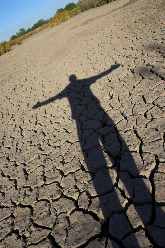
[Editor's note: Of 800 international journalists covering the Fourth World Water Forum underway in Mexico City, Chris Wood is the only Canadian. This is the first of several dispatches he will file for The Tyee.]
Water. H20. Agua. We're famous for it in Canada. We love knowing that we have more of it than any other country on Earth. We write, paint and sing about it. We seek it out for recreation and spiritual solace, elevating our lakes and rivers to the status of cultural icons. What's that old joke? A Canadian is someone who knows how to make love in a canoe?
But apparently, our love affair with water is an exclusive thing: what's ours is ours and the rest of an increasingly thirsty world is on its own. That, certainly, is the impression here in Mexico City, where much of the rest of the world has gathered on the site of a long-vanished lake for the Fourth World Water Forum.
The once-every-three-years event brings together private, public and civil-society participants from around the world to discuss solutions to humanity's persistently troubled relationship with the liquid that gave us life and sustains every Earthly society. On the agenda are themes addressing everything from the one-sixth of the world's population that still lacks safe drinking water, to how rich countries like Canada can better deal with the growing number of natural disasters involving water.
Alongside the policy sessions, two vast chambers of the Centro Banamex overflow with pavilions belonging to technology companies showing off their wares to interested utilities from scores of jurisdictions.
According to organizers, 123 countries have sent representatives. Togo is here. So is Lebanon. Vietnam. Nigeria. The Dutch, Italians, Japanese, Portuguese, Koreans and French have all sent leading technology companies to fish for contracts. The World Wildlife Fund is staging highly professional daily photo-ops alongside dozens of other activist groups taking advantage of the opportunity to press their cases. The Forum's Mexican hosts have organized a festival of water-related films to capture the cultural dimension of water. The Japanese sent their Crown Prince Naruhito to emphasize their concern. Reporters are sending coverage home to audiences in China, South Africa, Britain, the U.S. and elsewhere. There is even one determined columnist here from Bangladesh.
Canada? By all appearances, is missing in action.
At other international summits, Canadian diplomats fly the flag at press briefings, circulate background papers and position statements by the kilo and make a point of bringing Canadians working the event together. Aquí, nada. About a dozen officials from assorted government departments are here, but they are ordered not to talk to a reporter without first clearing the conversation with the prime minister's office. The International Development Research Centre - a crown corporation that funds research in third world countries - has a small booth at the very back of one hall. To get to it, I had to push past the crowd sipping wine and nibbling canapés supplied by the much more expansive USAid pavilion. A flying visit from new Environment Minister Rosa Ambrose is rumoured, but cannot be confirmed. [Update: Days later, a call from Minister Ambrose’s office confirms that she was, in fact, in Mexico for an overnight visit. While there, she met with representatives from Britain, France and the United States among others, to discuss responses to climate change. She also made a presentation to a round table on the subjects of "aboriginal water standards on reserves" and "local solutions to cleaning up water." The presentation lasted three minutes.]
Hope dribbling away
Nor is it just our government giving this forum a pass. Of 64 public, private and NGO groups that collaborated to produce a comprehensive review of water issues in North, Central and South America and the Caribbean, precisely one (The Canadian Water Resources Association) was from Canada. Apart from The Tyee, only one other Canadian news source (an in-house magazine published for Quebec agricultural coops), and no one at all from any of our national mainstream media, is accredited here.
Given the stakes, this is truly extraordinary. Those include not merely the bleak statistics that haunt every serious discussion about the world's water like accusing ghosts of the two bus loads of children who die of water-borne diseases or simple thirst every quarter of an hour. In much of Africa and South Asia, efforts to extend minimal services to the one billion people who lack reliable, safe water, or to the two billion who lack sanitary sewers, have not only stalled, they have fallen back.
In Bangladesh, wells drilled over the last two decades to supply rural communities with water have brought cancer to the internal organs and painful, scarring lesions to the hands and feet of their supposed beneficiaries-the result of natural arsenic leeching into the depleted water-table. In Kenya, women who once sent their children and livestock to fetch water from streams within sight of their homes, now undertake weary treks of up to 45 km to reach the nearest water. When they do manage to fill a 20-litre jug, the murky water takes two hours to settle out as much as a third of its volume in silt, leaving only the diminished remainder for drinking, cooking, washing or watering herds. And that is in good times, unlike the grinding drought that since last year has reduced some of the country's tribes to warring over water, with 40 people killed in one January clash.
Thirsty poster child
Mexico City itself is a poster child for the world's mounting thirst. The chaotic growth of this city of 25 million (more or less; no one really knows) long ago outstripped the capacity of utilities to keep up. Within a few miles of the Centro Banamex, where coolers dispense chilled bottles of purified water to refresh Forum delegates, pipes strung between ramshackle huts in one teeming colonia dispense water for about an hour every week-often after midnight. According to one city engineer, the entire capital has subsided by eight and a half meters over the last century, as water has been sucked from its underground aquifers faster than it is replaced.
Arguably, perhaps, Canadians' determined complacency in the face of other peoples' desperate thirst is a rational enough response. Despite guzzling, hosing and flushing our water down faster than any other nation on earth except the United States, what is left-a mind-boggling 100,000 cu m per year for each Canadian-is still the envy of drier places. Perhaps, we think that with 20 percent of the entire world's freshwater and one half of its greatest lake system, we needn't worry.
But we should.
Yes, we are blessed, hydrologically speaking; British Columbia especially so.
And in some respects, climate change may even multiply our blessing. Precipitation over the Canadian Rocky Mountains has been increasing at a steady rate of four percent a decade for the last 50 years-and seems likely to continue (a mixed blessing, I know, for Vancouverites still blinking in the light after this winter's record number of rainy days).
But the same climate changes promise far less welcome developments, as well. Two-thirds of Canada's fresh water is in the form of glaciers and the polar ice cap. Both are melting fast, with many of our glaciers likely to be gone in a generation. Meanwhile, warmer summers in the center of the country may reduce the St. Lawrence River to barely more than half its present volume by the middle of the century.
Then there is the stunning rise in water-related disasters: floods, droughts and intense storms. In the first nine decades of the last century, roughly eight such disasters struck the Western Hemisphere each year. Between 1990 and 1998, that number soared to nearly 41 disasters per year. Drought-driven firestorms in the Okanagan in 2003 and last year's flooding in Lethbridge and Calgary brought the trend home to Canadians.
Water wars?
And those are merely the direct threats we are, by and large, ignoring. There is also what might be called knock-on threats. "War for Water with the United States," blared a recent morning's banner headline in the up-market Mexico City tabloid UnoMasUno. It was quoting the Governor of Baja California State, Ernesto Elorduy Walter, who is incensed at American plans to rehabilitate a canal drawing water from the Colorado River just upstream of the US-Mexico border. The US plan threatens aquifers that supply some 25 million Mexicans and sustain US$240 million in economic activity. As such conflicts over water ignite in the dry south of the continent, it is difficult to imagine that they will not spread to the apparently lavishly moist north.
The potential for violence is not merely rhetorical. Last month, Britain's Defence Secretary John Reid put his country's armed forces on notice to prepare to respond to conflicts over water in half a dozen global trouble spots.
Beyond the walls of the Centro Banamex convention hall, with its view across a park where horses exercise around an oval on the site of the 1968 Olympic Games, the Mexican Army and National Police stand ready for more immediate action. Along every avenue for blocks around the Centro, squads of riot police lean on their shields, faces inscrutable beneath their Kevlar helmets as they shelter from the sun under purple clouds of jacaranda trees in bloom. They have been called into action once already: lining the Avenida de la Reforma two deep to keep 4,000 demonstrators away from Mexico's President Vicente Fox, as he formally opened the forum on its first day.
The previous federal government formally admitted that Canadians' love affair with our water could not really be kept private. The Liberals' policy conceded that the fresh water in our lakes, streams and ice fields is not, in any true sense, 'ours'; it is an interdependent part of the earth's finite resource. Even without the abundant self-interest at stake, the acknowledgement implies we ought at least to be ready to hear how the rest of the world is struggling to get by on its share of the resource.
Staying out of the pool is no way to begin.
Vancouver-based Chris Wood is a former national editor of Maclean's and an award-winning author of fiction and non-fiction. His latest book, on climate change and water, will appear next year from Raincoast Books. ![]()
















Tyee Commenting Guidelines
Comments that violate guidelines risk being deleted, and violations may result in a temporary or permanent user ban. Maintain the spirit of good conversation to stay in the discussion.
*Please note The Tyee is not a forum for spreading misinformation about COVID-19, denying its existence or minimizing its risk to public health.
Do:
Do not: